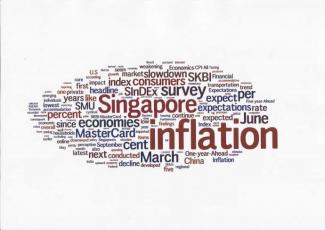
[Singapore, 20 April 2015 (Monday)] – Singaporeans’ One-year-Ahead inflation expectations witnessed its largest drop to 3.05%, according to the research findings of the latest quarterly survey for Singapore Index of Inflation Expectations (SInDEx) by Singapore Management University (SMU). Persistent weakness in oil prices accentuated by the uneven global recovery and trepidations on exchange rate fluctuations led to a significant drop in headline inflation rates across several influential economies, including China, India and the G3 economies (US, Eurozone and Japan). Reacting to global cues, both the One-year and the Five-year-Ahead Singaporeans’ inflation expectations saw the largest quarterly drop in headline inflation expectations despite an unscheduled loosening of the monetary policy in Singapore in January 2015.
The uncertainty surrounding the impending hike in the benchmark US interest rate also predicated moderation in inflation expectations as US Federal Reserve Board was perceived to be going for a mid-year rate hike, the first time such a hike would happen since the global financial crisis eight years ago. This external factor, which would dry up access to easy liquidity, might have contributed to the moderation in accommodation costs besides excess housing supply, while higher Certificate of Entitlement (COE) quota might have put a damper on the costs of private road transportation. Notwithstanding a tight labour market and consequent pass-through costs, Singaporeans perceive that overall prices from imported inflation have moderated enough to warrant a 3.05% year-on-year expectation of CPI-All Item inflation, the lowest since the launch of SInDEx in September 2011.
The SInDEx, which was originally developed by SMU’s Sim Kee Boon Institute for Financial Economics (SKBI), is derived from an online survey of around 500 randomly selected individuals representing a cross section of Singapore households.
The online survey helps researchers understand the behaviour and sentiments of decision makers in Singapore households. The quarterly SInDEx survey has yielded two indices, SInDEx1 and SInDeX5.
In the latest and fifteenth wave of the SInDEx survey conducted in March 2015, consumers shared their views on expectations of inflation-related variables over the medium term (One-year-Ahead) to long term (Five-year-Ahead).
The results of the March 2015 survey showed that compared to December 2014, the One-year-Ahead headline inflation (or CPI-All Item inflation) has moderated to 3.05% from 3.52% in December 2014, this is the lowest value of the headline inflation expectations since the survey’s inception in September 2011.
Compared to the historical headline inflation expectations average of 4.03% and the historical first quarter average of 3.77%, the current One-year-Ahead headline inflation expectations shows that Singapore households are well aware of the slump in oil prices and its overall impact on general price levels together with possible tightening of monetary policy.
Following the overall headline inflation, the One-year-Ahead Singapore core inflation expectations (excluding accommodation and private transportation related costs) also dropped to 3.44% in March 2015 (from 3.6% in December 2014). For a subgroup of the population who own their accommodation and use public transport, the One-year-Ahead Singapore core inflation rate was 3.52% in the March 2015 survey compared to 3.63% in December 2014. These respondents are possibly more informed about the Singapore core inflation rate as they don’t have to face changes on accommodation or private transportation costs directly.
One-year-Ahead Singapore Index of Inflation Expectations (SInDEx1), a composite weighted index of One-year-Ahead inflation expectations, maintained an overall downward trend to 3.26%, its lowest level since the survey’s inception in 2011, and much lower than its historical average of 4.08%. SInDEx1 is constructed as an alternative and more stable measure of inflation expectations by putting lower weightage on the more volatile and policy sensitive components like accommodation, private transportation, food and energy.
Assistant Professor of Finance Aurobindo Ghosh from the Lee Kong Chian School of Business who co-created SInDEx observed, “Despite a divergent but upbeat World Economic Outlook by the International Monetary Fund for 2015, low oil prices and fluctuating exchange rates are probably here to stay in the medium term. These phenomena have had a significant negative impact on expectations of inflation the world over including the G3 economies. Singapore is no different. Domestic factors such as the impending supply glut in COE quota and upcoming additional supply of accommodation, lower than expected pass-through costs despite tight labour market and medical subsidies have brought down the inflation expectations by Singaporeans in the current quarterly SInDEx survey.”
“Quarterly surveys like SInDEx on medium and long term inflation expectations usually provide lower fluctuations than short term inflation expectations. In a low inflationary environment, many consumers might not see a huge reduction in their overall expenditure. The main reason for this is because the consumption basket for measuring Consumer Price Index (CPI) is representative but not experienced by all individuals. Hence, survey-based instruments, even after corrections, might overestimate inflation expectations when there is near zero or negative inflationary environment,” Prof Ghosh added.
For the longer horizon, the Five-year-Ahead overall (CPI-All Items) inflation expectations in the March 2015 survey dropped by 30 basis points to 4.16% (from 4.48% in December 2014), its lowest recorded level since the survey’s inception in 2011. The Five-year-Ahead Singapore core inflation rate (excluding accommodation and private road transportation related costs) also moderated to 3.94% from 4.12% recorded in December 2014, the first time it fell below 4% since the survey was initiated in September 2011.
The composite Five-year-Ahead Singapore Index of Inflation Expectations (SInDEx5) in March 2015 dropped to 4.05% from 4.26% in December 2014, still significantly lower than SInDEx5’s historical average of 4.78%.
For more information, please contact
Teo Chang Ching (Mr)
Assistant Director
Corporate Communications
DID: 6828 0451
Email: ccteo [at] smu.edu.sg